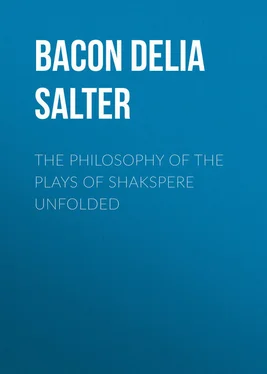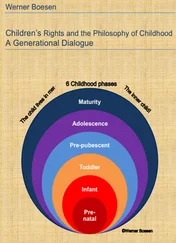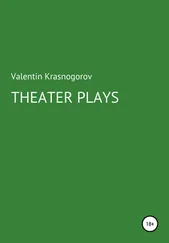Delia Bacon - The Philosophy of the Plays of Shakspere Unfolded
Здесь есть возможность читать онлайн «Delia Bacon - The Philosophy of the Plays of Shakspere Unfolded» — ознакомительный отрывок электронной книги совершенно бесплатно, а после прочтения отрывка купить полную версию. В некоторых случаях можно слушать аудио, скачать через торрент в формате fb2 и присутствует краткое содержание. Жанр: literature_19, foreign_antique, foreign_prose, на английском языке. Описание произведения, (предисловие) а так же отзывы посетителей доступны на портале библиотеки ЛибКат.
- Название:The Philosophy of the Plays of Shakspere Unfolded
- Автор:
- Жанр:
- Год:неизвестен
- ISBN:нет данных
- Рейтинг книги:3 / 5. Голосов: 1
-
Избранное:Добавить в избранное
- Отзывы:
-
Ваша оценка:
- 60
- 1
- 2
- 3
- 4
- 5
The Philosophy of the Plays of Shakspere Unfolded: краткое содержание, описание и аннотация
Предлагаем к чтению аннотацию, описание, краткое содержание или предисловие (зависит от того, что написал сам автор книги «The Philosophy of the Plays of Shakspere Unfolded»). Если вы не нашли необходимую информацию о книге — напишите в комментариях, мы постараемся отыскать её.
The Philosophy of the Plays of Shakspere Unfolded — читать онлайн ознакомительный отрывок
Ниже представлен текст книги, разбитый по страницам. Система сохранения места последней прочитанной страницы, позволяет с удобством читать онлайн бесплатно книгу «The Philosophy of the Plays of Shakspere Unfolded», без необходимости каждый раз заново искать на чём Вы остановились. Поставьте закладку, и сможете в любой момент перейти на страницу, на которой закончили чтение.
Интервал:
Закладка:
For this is the Poet who cries 'Westward Ho!' But he has not got into the woods yet in this play. He is only on the edge of them as yet. It is under the blue roof of that same dome which is 'too high,' the princess here says, to belong to the pygmy that this Philosopher likes so well to bring out and to measure under that canopy – it is 'out of doors' that this new speech on behalf of a new learning is spoken. But there is a close rim of conventionalities about us still. It is a Park that this audacious proposal is uttered in. But nothing can be more orderly, for it is 'a Park with a Palace in it.' There it is, in the background. If it were the Attic proscenium itself hollowed into the south-east corner of the Acropolis, what more could one ask. But it is the palace of the King of — Navarre , who is the prince of good fellows and the prince of good learning at one and the same time, which makes, in this case, the novelty. 'A Park with a Palace in it' makes the first scene. 'Another part of the same' with the pavilion of a princess and the tents of her Court seen in the distance, makes the second; and the change from one part of this park to another, though we get into the heart of it sometimes, is the utmost license that the rigours of the Greek Drama permit the Poet to think of at present. This criticism on the old learning, this audacious proposal for the new, with all the bold dramatic illustration with which it is enforced, must be managed here under these restrictions. Whatever 'persons' the plot of this drama may require for its evolutions, whatever witnesses and reporters the trial and conviction of the old learning, and the definition of the ground of the new, may require, will have to be induced to cross this park at this particular time, because the form of the new art is not yet emancipated, and the Muse of the Inductive Science cannot stir from the spot to search them out.
However, that does not impair the representation as it is managed. There is a very bold artist here already, with all his deference for the antique. We shall be sure to have all when he is the plotter. The action of this drama is not complicated. The persons of it are few; the characterization is feeble, compared with that of some of the later plays; but that does not hinder or limit the design, and it is all the more apparent for this artistic poverty, anatomically clear; while as yet that perfection of art in which all trace of the structure came so soon to be lost in the beauty of the illustration, is yet wanting; while as yet that art which made of its living instance an intenser life, or which made with its living art a life more living than life itself, was only germinating.
The illustration here, indeed, approaches the allegorical form, in the obtrusive, untempered predominance of the qualities represented, so overdone as to wear the air of a caricature, though the historical combination is still here. These diagrams are alive evidently; they are men, and not allegorical spectres, or toys, though they are 'painted in character.'
The entire representation of the extant learning is dramatically produced on this stage; the germ of the 'new' is here also; and the unoccupied ground of it is marked out here as, in the Advancement of Learning, by the criticism on the deficiences of that which has the field. Here, too, the line of the extant culture, – the narrow indented boundary of the culture that professed to take all is always defining the new, – cutting out the wild not yet visited by the art of man; – only here the criticism is much more lively, because here 'we come to particulars ,' a thing which the new philosophy – much insists on; and though this want in learning, and the wildness it leaves, is that which makes tragedies in this method of exhibition; it has its comical aspect also; and this is the laughing and weeping philosopher in one who manages these representations; and in this case it is the comical aspect of the subject that is seized on.
Our diagrams are still coarse here, but they have already the good scientific quality of exhausting the subject. It is the New School that occupies the centre of the piece. Their quarters are in that palace, but the king of it is the Royalty (Raleigh) that founded and endowed this School – that was one of his secret titles, – and under that name he may sometimes be recognized in descriptions and dedications that persons who were not in the secret of the School naturally applied in another quarter, or appropriated to themselves. ' Rex was a surname among the Romans,' says the Interpreter of this School, in a very explanatory passage, 'as well as King is with us .' It is the New School that is under these boughs here, but hardly that as yet.
It is rather the representation of the new classical learning, – the old learning newly revived, – in which the new is germinating. It is that learning in its first effect on the young, enthusiastic, but earnest practical English mind. It is that revival of the old learning, arrested, daguerréotyped at the moment in which the new begins to stir in it, in minds which are going to be the master-minds of ages.
'Common sense' is the word here already. 'Common sense' is the word that this new Academe is convulsed with when the curtain rises. And though it is laughter that you hear there now, sending its merry English peals through those musty, antique walls, as the first ray of that new beam enters them; the muse of the new mysteries has also another mask, and if you will wait a little, you shall hear that tone too. Cries that the old mysteries never caught, lamentations for Adonis not heard before, griefs that Dionysus never knew, shall yet ring out from those walls.
Under that classic dome which still calls itself Platonic, the questions and experiments of the new learning are beginning. These youths are here to represent the new philosophy, which is science, in the act of taking its first step. The subject is presented here in large masses. But this central group, at least, is composed of living men, and not dramatic shadows merely. There are good historical features peering through those masks a little. These youths are full of youthful enthusiasm, and aspiring to the ideal heights of learning in their enthusiasm. But already the practical bias of their genius betrays itself. They are making a practical experiment with the classics, and to their surprise do not find them 'good for life.'
Here is the School, then, – with the classics on trial in the persons of these new school-men. That is the central group. What more do we want? Here is the new and the old already. But this is the old revived – newly revived; – this is the revival of learning in whose stimulus the new is beginning. There is something in the field besides that. There is a 'school-master abroad' yet, that has not been examined. These young men who have resolved themselves in their secret sittings into a committee of the whole, are going to have him up. He will be obliged to come into this park here, and speak his speech in the ear of that English 'common sense,' which is meddling here, for the first time, in a comprehensive manner with things in general; he will have to 'speak out loud and plain,' that these English parents who are sitting here in the theatre, some of 'the wiser sort' of them, at least, may get some hint of what it is that this pedagogue is beating into their children's brains, taking so much of their glorious youth from them – that priceless wealth of nature which none can restore to them, – as the purchase. But this is not all. There is a man who teaches the grown-up children of the parish in which this Park is situated, who happens to live hard by, – a man who professes the care and cure of minds. He, too, has had a summons sent him; there will be no excuse taken; and his examination will proceed at the same time. These two will come into the Park together; and perhaps we shall not be able to detect any very marked difference in their modes of expressing themselves. They are two ordinary, quiet-looking personages enough. There is nothing remarkable in their appearance; their coming here is not forced. There are deer in this Park; and 'book-men' as they are, they have a taste for sport also it seems. Unless you should get a glimpse of the type, – of the unit in their faces – and that shadowy train that the cipher points to, – unless you should observe that their speech is somewhat strongly pronounced for an individual representation – merely glancing at them in passing – you would not, perhaps, suspect who they are. And yet the hints are not wanting; they are very thickly strewn, – the hints which tell you that in these two men all the extant learning, which is in places of trust and authority, is represented; all that is not included in that elegant learning which those students are making sport of in those 'golden books' of theirs, under the trees here now.
Читать дальшеИнтервал:
Закладка:
Похожие книги на «The Philosophy of the Plays of Shakspere Unfolded»
Представляем Вашему вниманию похожие книги на «The Philosophy of the Plays of Shakspere Unfolded» списком для выбора. Мы отобрали схожую по названию и смыслу литературу в надежде предоставить читателям больше вариантов отыскать новые, интересные, ещё непрочитанные произведения.
Обсуждение, отзывы о книге «The Philosophy of the Plays of Shakspere Unfolded» и просто собственные мнения читателей. Оставьте ваши комментарии, напишите, что Вы думаете о произведении, его смысле или главных героях. Укажите что конкретно понравилось, а что нет, и почему Вы так считаете.












